

QI - Quite Interesting - I Am Not A Robot. 'The goal is to automate us': welcome to the age of surveillance capitalism. Ghostery Makes the Web Cleaner, Faster and Safer! DuckDuckGo — Privacy, simplified. Mind-reading technology is closer than you think. Google's new reCaptcha has a dark side. Who cares about liberty? Julia Angwin and Trevor Paglen on our big pri. Facebook says 'issue' not a hack. SAN JOSE, Calif.

(KTVU) - It’s unclear what caused Facebook to be down for hours on Wednesday. Users around the world reported issues with logging and posting on the site as well as Instagram and What’s App. At San Jose State, many students eat, live and breathe social media so when they couldn't log onto Facebook and Instgram. Why Facebook’s Banned ‘Research’ App Was So Invasive. Facebook’s Privacy Message Undermined by the Times—Again. Facebook Bug Bounty Program Makes Biggest Reward Payout Yet.
Nita Farahany: When technology can read minds, how will we protect our privacy? The Real Rules for Strong Computer Passwords Go Against Everything You've Been Told. Mozilla - *privacy not included. The Creepiest, Spying-est Gifts to Not Buy This Year. HTTPS Everywhere. 11 Steps Toward Better Digital Hygiene. Iran's New Facebook Trolls Are Using Russia's Playbook. I Bought Used Voting Machines on eBay for $100 Apiece. What I Found Was Alarming.
Firefox will block all trackers automatically. This week, Mozilla announced that its browser Firefox will start blocking all cross-site third-party trackers–the cookies hiding in the background that follow your clicks across the web, reporting your activity to advertisers as you move between websites.
Including these settings, by default, is the best way to protect users from inadvertently giving third parties data about users’ behavior. Just as people tend not to read long privacy policies, they also shouldn’t be expected to change the settings to disable third-party trackers on every single site they visit. Third-party cookies have dropped by 22% since GDPR took effect. 7 in 10 smartphone apps share your data with third-party services. Our mobile phones can reveal a lot about ourselves: where we live and work; who our family, friends and acquaintances are; how (and even what) we communicate with them; and our personal habits.
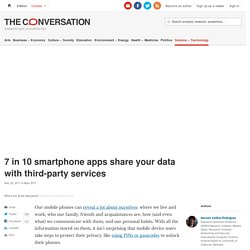
With all the information stored on them, it isn’t surprising that mobile device users take steps to protect their privacy, like using PINs or passcodes to unlock their phones. The research that we and our colleagues are doing identifies and explores a significant threat that most people miss: More than 70 percent of smartphone apps are reporting personal data to third-party tracking companies like Google Analytics, the Facebook Graph API or Crashlytics. When people install a new Android or iOS app, it asks the user’s permission before accessing personal information. Generally speaking, this is positive. How to delete all your cookies. How Israeli spyware tried to hack an Amnesty activist’s phone. Is Apple's HomePod Always Listening to You? Why we choose terrible passwords, and how to fix them. The first Thursday in May is World Password Day, but don’t buy a cake or send cards.
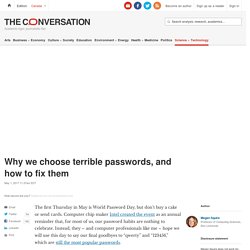
Computer chip maker Intel created the event as an annual reminder that, for most of us, our password habits are nothing to celebrate. Instead, they – and computer professionals like me – hope we will use this day to say our final goodbyes to “qwerty” and “123456,” which are still the most popular passwords. The problem with short, predictable passwords The purpose of a password is to limit access to information. Having a very common or simple one like “abcdef” or “letmein,” or even normal words like “password” or “dragon,” is barely any security at all, like closing a door but not actually locking it.
Hackers’ password cracking tools take advantage of this lack of creativity. Instead, the cracking software computes the hash values for large numbers of possible passwords and compares the results to the hashed passwords in the stolen file. What Advertisers Know About You: Privacy & Personally Identifiable Info. Leaks of NSA surveillance programs have instilled fear and (legitimate) privacy concerns among Internet users, resulting in reports of people reducing their online activity.
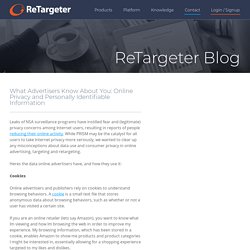
While PRISM may be the catalyst for all users to take Internet privacy more seriously, we wanted to clear up any misconceptions about data use and consumer privacy in online advertising, targeting and retargeting. Heres the data online advertisers have, and how they use it: Cookies Online advertisers and publishers rely on cookies to understand browsing behaviors. An app for protecting kids online is growing popular with autocrats. BBC World Service - The Inquiry, Can Computers Predict Crimes That Haven’t Ha...
Live Streams & Video on Demand: Watch for Free. Scientists Take Over Computer by Encoding Malware in DNA. Gender is personal – not computational. Imagine walking down the street and seeing advertising screens change their content based on how you walk, how you talk, or even the shape of your chest.
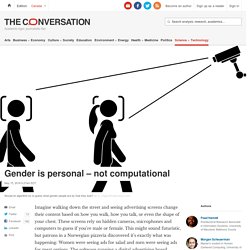
These screens rely on hidden cameras, microphones and computers to guess if you’re male or female. This might sound futuristic, but patrons in a Norwegian pizzeria discovered it’s exactly what was happening: Women were seeing ads for salad and men were seeing ads for meat options. The software running a digital advertising board spilled the beans when it crashed and displayed its underlying code. The motivation behind using this technology might have been to improve advertising quality or user experience. UK Watchdog Calls for Face Recognition Ban Over 90 Percent False-Positive Rate. Your smart home is trying to reprogram you. A father finds out his daughter is pregnant after algorithms identify tell-tale patterns in the family’s store card data.
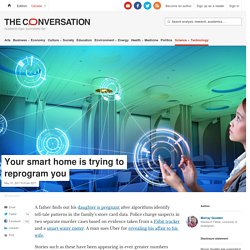
Police charge suspects in two separate murder cases based on evidence taken from a Fitbit tracker and a smart water meter. A man sues Uber for revealing his affair to his wife. Stories such as these have been appearing in ever greater numbers recently, as the technologies involved become ever more integrated into our lives. They form part of the Internet of Things (IoT), the embedding of sensors and internet connections into the fabric of the world around us. 4 ways ‘internet of things’ toys endanger children. As Amazon releases an Echo Dot smart-home device aimed at children, it’s entering a busy and growing marketplace.

More than one-third of U.S. homes with children has at least one “internet of things” connected toy – like a cuddly creature who can listen to and respond to a child’s inquiries. Many more of these devices are on the way, around the world and in North America specifically. Alexa and Siri Can Hear This Hidden Command. You Can’t. As Thailand restricts internet freedom, cyber activists work to keep an open web. On June 9 2017, a Thai man was sentenced to 35 years in jail for sharing Facebook posts.
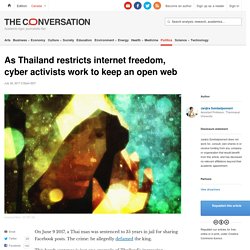
The crime: he allegedly defamed the king. This harsh sentence is just one example of Thailand’s increasing repression in the digital sphere. Since the 2014 coup, the Thai military junta has take a hard stance toward online critics and dissidence. Cryptojacking spreads across the web. Right now, your computer might be using its memory and processor power – and your electricity – to generate money for someone else, without you ever knowing.
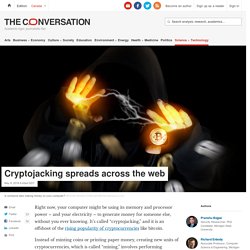
It’s called “cryptojacking,” and it is an offshoot of the rising popularity of cryptocurrencies like bitcoin. Instead of minting coins or printing paper money, creating new units of cryptocurrencies, which is called “mining,” involves performing complex mathematical calculations. These intentionally difficult calculations securely record transactions among people using the cryptocurrency and provide an objective record of the “order” in which transactions are conducted. Faceblock. How Europe’s new privacy rule is reshaping the internet.
If you’ve been looking for it, you may have seen a lot of privacy policies change in the past few months. From Google to Slack, companies are quietly updating terms, rewriting contracts, and rolling out new personal data tools in preparation for a massive shift in the legal landscape. So far, it’s mostly been a problem for legal departments, but as policy changes and contract fights go public, it’s started affecting the average web user, too. The rule is called the General Data Protection Regulation (or GDPR), and it’s poised to reshape some of the messiest parts of the internet. What are you revealing online? Much more than you think. What can be guessed about you from your online behavior? Two computer privacy experts — economist Alessandro Acquisti and computer scientist Jennifer Golbeck — on how little we know about how much others know. The best indicator of high intelligence on Facebook is apparently liking a page for curly fries.
At least, that’s according to computer scientist Jennifer Golbeck (TED Talk: The curly fry conundrum), whose job is to figure out what we reveal about ourselves through what we say — and don’t say — online. Of course, the lines between online and “real” are increasingly blurred, but as Golbeck and privacy economist Alessandro Acquisti (TED Talk: Why privacy matters) both agree, that’s no reason to stop paying attention. How you helped create the crisis in private data. As Facebook’s Mark Zuckerberg testifies before Congress, he’s likely wondering how his company got to the point where he must submit to public questioning.
It’s worth pondering how we, the Facebook-using public, got here too. The scandal in which Cambridge Analytica harvested data from millions of Facebook users to craft and target advertising for Donald Trump’s presidential campaign has provoked broad outrage. More helpfully, it has exposed the powerful yet perilous role of data in U.S. society. Amazon patent reveals 'voice sniffer algorithm' that could analyze conversations. Amazon's Echo smart speaker starts up after a user calls for Alexa, the artificial intelligence that powers the device, but a recent patent suggests that the next step for the device may be listening in on any conversation -- not just after the "Alexa" command is said by its user. An algorithm proposed in a pending patent filed by the e-commerce giant in 2017 shows advanced artificial intelligence that would allow an Amazon device to listen to a conversation and analyze it for certain words that are said.
A "voice sniffer algorithm" is what the patent calls the technology. "The more words they collect, the more the company gets to know you," Daniel Burrus, a tech analyst with Burrus Research Associates, Inc., told ABC News. Regulating Facebook won’t prevent data breaches. Elizabeth Denham, Information Commissioner. Elizabeth Denham was appointed UK Information Commissioner in July 2016, having previously held the position of Information and Privacy Commissioner for British Columbia, Canada and Assistant Privacy Commissioner of Canada. She has set out a commitment to increase consumer trust people have in what happens to their personal data.
This forms the basis of her strategic plan, and has been demonstrated in her commitment to ensuring companies are transparent with the public about how personal information is used, notably with high-profile investigations into Yahoo, Camelot, WhatsApp and Facebook. The Commissioner has also demonstrated a focus on the essential role data protection can play in innovation, and the importance of organisations understanding the growing impetus on companies to be accountable for what they do with personal data.
This forms a central part of the new General Data Protection Regulation, which comes into force in May 2018. FREE COPIES: The Art of Invisibility by Kevin Mitnick. Yes, your smartphone camera can be used to spy on you… Machine Learning is Fun! Part 4: Modern Face Recognition with Deep Learning. Face Recognition — Step by Step. How Google uses your personal information. Why data protection matters. Basic Privacy Settings & Tools. How to find out what Facebook knows about you. With more than 2 billion monthly active users, Facebook can keep tabs on nearly a third of the world's population. Whether you visit the social network daily (as 1.32 billion people do) or only log on to RSVP to events, you should be aware of how much of your personal data you're giving to the site, and the company behind it.
Facebook primarily employs your information to serve you more relevant targeted advertising. While some see this as uncomfortably intrusive, others accept the ads as the price they pay for the network's free services and tools. Farewell, Android Pay. We hardly tapped you. Wi-Fi Security Hacked - KRACK Spies on WPA2. How to Keep Your Bitcoin Safe and Secure. Andy Greenberg. Apple's Core ML Could Surface Your iOS Secrets. How to Lock Down Your Facebook Privacy Settings. Watch a 10-Year-Old Beat Apple's Face ID on His Mom's iPhone X. Louise Matsakis. Is there such a thing as online privacy? 7 essential reads. Over the course of 2017, people in the U.S. and around the world became increasingly concerned about how their digital data are transmitted, stored and analyzed. As news broke that every Yahoo email account had been compromised, as well as the financial information of nearly every adult in the U.S., the true scale of how much data private companies have about people became clearer than ever.
This, of course, brings them enormous profits, but comes with significant social and individual risks. Edward Snowden’s new app turns any Android phone into a surveillance system. NSA Whistleblower Edward Snowden is among the backers of a new surveillance app that helps guard against computer hijackings. Haven is an open source app that will run on any Android phone, particularly inexpensive and older devices.
Want to Evade NSA Spying? Don't Connect to the Internet. How One of Apple's Key Privacy Safeguards Falls Short. Choose better passwords with the help of science August 30, 2017 11.32am BST. Is Apple's HomePod Always Listening to You? Availability and quality of mobile health app privacy policies. 7 in 10 smartphone apps share your data with third-party services. 4 Reasons You Should Be Using the Disconnect App Every Time You Browse Online. Why installing software updates makes us WannaCry. Microsoft's New Real-World Search Engine Is Incredible and Horrifying.
Why we choose terrible passwords, and how to fix them. Police around the world learn to fight global-scale cybercrime. Right to be forgotten - ReputationDefender UK. Row over US ISP customer data sales. Eight Signs Your PC Might Be A Zombie - What to Do. 10 Top Rootkit Scanners. McAfee Free Tools. Anti-Rootkit BETA - Free Rootkit Scanner & Remover. Defending your rights in the digital world.
Resist Surveillance. The Last Password You Have to Remember. Adblock Plus - Surf the web without annoying ads! Privacy tools - encryption against global mass surveillance □ Tor Browser. Pronounceable Password Generator by Designeus Web Studio. Voiceprint Verification. Emoji Passwords are Coming: Harder to Hack and Easier to Remember. Privacy Badger.